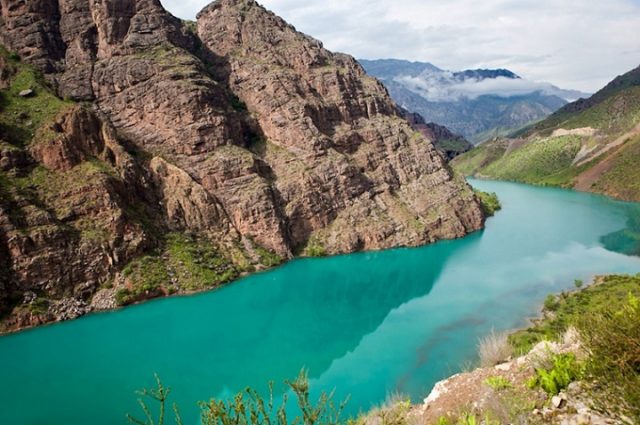
Uzbekistan and Kyrgyzstan Undertake Resolving Their Water Disputes
Publication: Eurasia Daily Monitor Volume: 14 Issue: 131
By:

Transboundary water sharing is one of the most contentious issues dividing Central Asian countries. And as Uzbekistan continues to actively pursue better relations with its neighbors (see EDM, May 24, June 27, September 12, 18), discussions over water usage are moving to the top of the agenda. Uzbekistan has already directed a great deal of energy and attention to improving relations with Kyrgyzstan; and almost a year after the process was launched, the two countries are now reviewing their water disputes.
Kambat-Ata 1 is a large hydropower station Kyrgyzstan has been planning to build for some time. The project was vehemently opposed by Uzbekistan under its previous president, Islam Karimov, for fear the dam would block large amounts of water upriver and deprive Uzbekistan’s downstream agricultural lands from securing sufficient volumes of irrigation water. But now, not only has Tashkent eased that opposition, it furthermore wants to participate in building the Kambat-Ata 1 station (AKIpress, October 6). The 1,860-megawatt (MW) hydroelectric power plant comes at a steep price of $3 billion, according to the feasibility study carried out by a Canadian company back in 2014 (Vecherniy Bishkek, July 19, 2014).
Energy firms in both Kyrgyzstan and Uzbekistan have already taken steps to draw up initial plans for financing the project, which heretofore had been the major issue bogging down progress on constructing the dam (Kun.uz, October 10). Bishkek had found and later lost investors in the Kambat-Ata 1 project on two previous occasions. Indeed, Tashkent’s opposition to the project had likely contributed to the lack of interest by investors. In 2012, Russia’s RusHydro committed to become the sole builder, but pulled out in 2016, without even starting construction, because of outstanding land disputes and loss of interest in the project (Current Time, January 26, 2016). Then, in July 2017, the Czech company Liglass Trading entered into an agreement to build several small hydropower stations and pay off Kyrgyzstan’s $37 million debt to RusHydro over Kambar-Ata 1 (Vedomosti, July 10). However, in less than three months, that deal fell through as well due to the inability of Liglass Trading to meet its financial obligations within a set period of time (Gov.kg, October 10).
By recently dropping its opposition to the project and turning from foe to friend on this issue, Uzbekistan has caused “tectonic changes” to the benefit of the power station’s construction, according to Kyrgyzstan’s Deputy Prime Minister Duyshenbek Zilaliev (24.kg, September 19). Invigorated investors are currently reaching out to the Kyrgyz Republic to express interest in participating in the project.
Less controversial or well-known in the international arena, but more politically charged than Kambat-Ata 1 is the issue over the Kasan-Say (Orto-Tokoy) water reservoir, found in Kyrgyzstan. According to Kyrgyzstani officials, the reservoir, which is located eight miles from the border with Uzbekistan, is used solely by Uzbekistan for irrigation and guarded by Uzbekistani law enforcement officials (24.kg, September 4). After Kyrgyzstan unilaterally nationalized the water reservoir in 2016, both sides deployed their troops—though the standoff dissipated after several weeks, in August 2016 (Kloop.kg, September 20, 2016; see EDM, September 13, 2016).
In February 2017, Adkham Ikromov, Uzbekistan’s deputy prime minister and the most senior official in the early stages of public diplomacy between the two countries, was turned away at a checkpoint to enter the village around the reservoir for a scheduled meeting. As a result, he and his Kyrgyzstani counterpart exchanged testy barbs with one another (Centrasia.ru, February 23). The incident likely elevated the issue to the presidential level. Consequently, one of the agreements that transpired after President Almazbek Atambayev’s latest visit to Tashkent, on October 5–6, was the official transfer of the Kasan-Say water reservoir to Kyrgyzstan, while Uzbekistan would finance the maintenance of the structure (Kun.uz, October 11). The incident illustrates how unresolved local issues around resources continue to play a major role in relations—even though the two presidential administrations had until now been much more focused on settling a series of unrelated bilateral border disputes.
It is noteworthy that while the two countries are resolving the ownership of infrastructures in each other’s territories alongside border issues, officials on both sides want to ensure that no one—in particular local people—comes under the impression that their country is giving up territorial claims. The land issue is a particularly sensitive matter for ethnic Kyrgyz, hence the authorities’ focus on trying to dampen the potential flare-up of nationalistic feelings. Illustratively, last month, Bishkek’s special representative on issues of delimitation and demarcation of border lines, Kurbanbay Iskandarov, explicitly stated that “not a meter of Kyrgyz land was given to Uzbekistan and not a meter was taken from Uzbekistan” (Kabar.kg, September 15). From the Uzbekistani side, Ilhomjon Nematov, the country’s ambassador on special issues, stated that neither Central Asian neighbor is losing anything in the process (Kun.uz, September 10).
Uzbekistan habitually frames regional transboundary water issues around the Aral Sea and the ecological disaster surrounding it. The Aral Sea—a large lake between Uzbekistan and Kazakhstan that today is mostly dried up due to decades of water mismanagement—is one of world’s largest modern ecological catastrophes. Building large hydroelectric plants and dams upriver would further exacerbate the existing “fragile water and ecological balance” in the region, according to Uzbekistan’s former United Nations representative, Ildar Shigabutdinov (Un.org, February 19, 2014; Gazeta.uz, September 20, 2017). Therefore, Uzbekistan’s recent consent to large hydropower projects in Kyrgyzstan represents a truly monumental concession on the part of Tashkent. But it is also an opportunity for Uzbekistan to exercise leverage over the construction process going forward, thus ensuring that the upstream project does not ultimately become disadvantageous.



